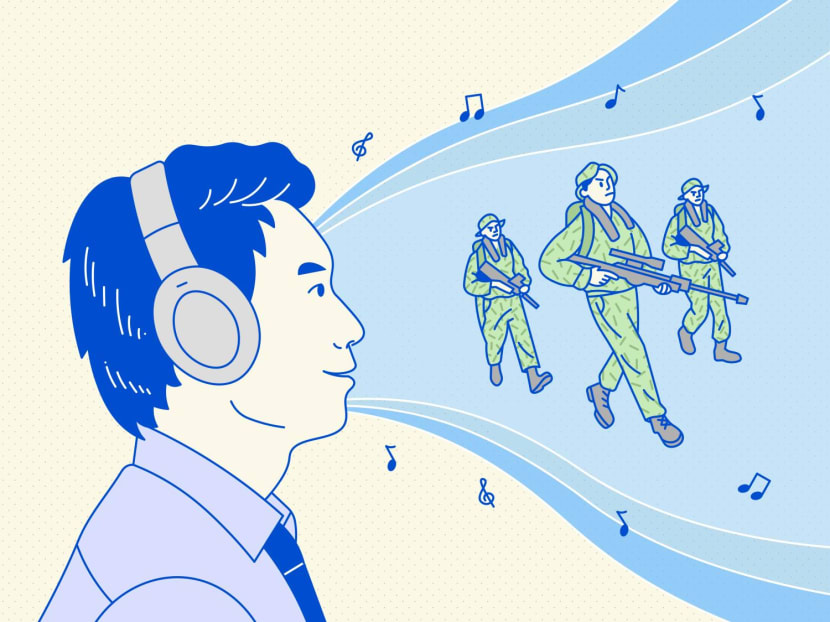Gen Zen: Do you often think about the past? Here’s why you do, and the good and bad of it

(Illustration: CNA/Nurjannah Suhaimi)
SINGAPORE — Whenever I plug in my earphones and hear a song that I used to obsess over, a movie montage of memories begins to play in my head.
These include the carefree days I’ve had as a student and the silly banter with my mates that made up a large part of my National Service.
In these moments, one thought never fails to permeate my mind: I wish I could go back and relive them all over again.
Strangely though, what fills me with warm nostalgia now are moments that I used to dread.
Like many 18- to 20-year-old Singaporean men of my generation, I had an app on my phone that counted down the days I had left before I was free from the shackles of a green army uniform.
I also spent a large part of university as a lone wolf, because I had wanted to skip tertiary education altogether.
Now that I am out of the proverbial trenches — a full-fledged journalist doing what I love — why do I still frequently look back on those days with fondness, when I know they caused me so much misery?
ROSY RETROSPECTION
Speaking to some mental health experts, I was heartened to hear them say that my obsession with the past is not all that unusual.
Mental health specialist James Chong said that nostalgia is a complex and multi-faceted emotion. There is even a psychological phenomenon that explains this.
Rosy retrospection is a cognitive bias where our minds tend to recall past events more positively than they really were.
This could be because we gain an “emotional distance” from these events, which can end up softening the negative and highlighting the positive, Mr Chong said. He is co-founder and clinical director at psychotherapy and counselling clinic The Lion Mind.
But why do our brains go there in the first place?
Ms Priscilla Shin, principal psychotherapist at Range Counselling Services, said that nostalgia can provide a sense of emotional comfort and evoke feelings of familiarity and security — especially during times of change or uncertainty.
“Reflecting on past experiences, even difficult ones, reinforces our sense of self and personal growth.
“The past can also seem simpler in retrospect, with life's complexities appearing to be less overwhelming,” she added.
This was very much a lightbulb moment.
In hindsight, it made sense. My habit of hopping on the train heading backwards in time seems to have been at its most pronounced at the start of the Covid-19 pandemic, when life never seemed to be more uncertain.
With nothing to look forward to, I spent hours on end cooped up in my room bingeing on nostalgia, which came in the form of dated television shows and old text messages with friends.
It felt like a much simpler, less anxiety-ridden time — even if that was never the case.
Furthermore, watching a film is a lot easier than making one — and why wouldn’t you watch, on repeat, a movie in your head where you’re the main protagonist?
CAN OUR ROSE-TINTED GLASSES BLIND US?
Well, there are some compelling reasons why we should aim to put those rose-tinted glasses aside once in a while, the experts said.
First of all, longing for the past can create a sense of loss or sadness, exacerbate feelings of depression or anxiety, and lead to a sense of stagnation.
Also, time spent living in your head equates to time not spent living in the present, Mr Chong said.
Furthermore, Ms Shin said, when we romanticise the past, it keeps us focused on what was, rather than what could be, and this impedes our personal growth.
“This can also undermine our resilience by making us less adaptable to change as we struggle to cope with the inevitable challenges of life,” Ms Shin added.
The solution to all this is, of course, to turn our gazes forward.
Both Ms Shin and Mr Chong suggested setting clear, achievable goals that shift our focus from the past to the future.
Finding excitement and fulfilment in the journey towards your goals can keep you engaged and motivated, encouraging a forward-looking perspective, Mr Chong said.
Cultivating strong, supportive relationships to help us cope with our current challenges can also help reduce the allure of the past, Ms Shin suggested.
We can also choose to practise mindfulness and journalling to help us process our thoughts and feelings, providing clarity and grounding in the present.
THE REAR-VIEW MIRROR CAN BE USEFUL
However, even though we should not spend all our time living in the past, looking in the rear-view mirror once in a while can be beneficial, too.
Gatherings with friends and family are often fun precisely due to our shared nostalgia — we use them to strengthen connections with others, deepen these relationships and increase our sense of belonging with them.
Remembering the difficult moments I’ve had and realising that I’ve overcome them often gives me a spurt of confidence that I would be able to tackle life’s future challenges ahead.
It also aids us in reflection — giving us clues about our core values and interests by understanding what has brought us joy, satisfaction or meaning.
More importantly, Ms Shin said, we can consciously choose to view our past as a source of growth and appreciation, rather than as a point of comparison or regret.
This to me is the key to reframing the dispirited nature of my recollections.
The next time an old song comes up and the waves of sentimentality wash over me, I’ll try to revisit my experiences for what they really were and appreciate how they’ve made me who I am — just briefly.
Then, perhaps, I’ll find a new song to listen to.








